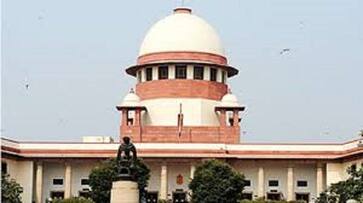Supreme Court on Tuesday said it would take an 'in-chamber' decision on listing of a petition challenging the constitutional validity of Article 35-A, which provides special rights and privileges to permanent residents of Jammu and Kashmir
New Delhi: The Supreme Court on Tuesday said it would take an "in-chamber" decision on listing of a petition challenging the constitutional validity of Article 35-A, which provides special rights and privileges to permanent residents of Jammu and Kashmir.
Advocate Bimal Roy Jad mentioned the matter before the bench headed by Chief Justice Ranjan Gogoi and also comprising Justices L Nageswara Rao and Sanjiv Khanna.
The CJI assured the petitioner that the date for hearing the case will be fixed soon.
The petition filed in the Supreme Court states that due to Article 35A, Indians outside Jammu and Kashmir are not entitled to buy real estate and vote in the state. Also, the women of Jammu and Kashmir lose their rights in the state if they marry a person outside Kashmir. Even their children do not get permanent resident certificates.
Earlier, the then CJI had postponed the hearing of the three-judge bench headed by Deepak Mishra till January 19. In the previous hearing, the Supreme Court had said that it will consider whether Article 35A violates the Constitution's basic structure.
The apex court had adjourned the hearing in August 2018 on a batch of petitions challenging Article 35 A till January this year, after taking note of submissions of the Centre and the state government that there was a law and order problem in the state.
How is Article 35 (A) affecting the lives of millions of people?
- 35 (A) gives authority to the Jammu and Kashmir Legislative Assembly to make decisions on the citizenship, and rights of the people living there. But on the contrary, it has made lakhs of people refugees.
- In 1947, during the Indo-Pak partition, millions of people came to India as refugees and later became Indian citizens. But this did not happen with the people in Jammu and Kashmir. According to data, around 5,764 Hindu families came to the state at the time of partition and settled there. But the irony is that even today, these families are considered as refugees and are deprived of all fundamental rights.
- It has not only happened with families from Pakistan but also to people of Gorkha community who have lived in Jammu and Kashmir for the last several years, who are not counted as citizens here.
- Dalit families who were brought from Punjab in 1957 to work as sanitation employees, have had the worst luck. For the past 60 years, these people have been doing cleaning work and are still not considered permanent residents of Jammu and Kashmir.
- Another major tragedy of 35 (A) is that the children of Kashmiri men who marry non-Kashmiris here get the status of permanent citizens and all rights, while the citizenship of women who marry outside the state is terminated.
Last Updated Jan 22, 2019, 2:45 PM IST









![Salman Khan sets stage on fire for Anant Ambani, Radhika Merchant pre-wedding festivities [WATCH] ATG](https://static-gi.asianetnews.com/images/01hr1hh8y86gvb4kbqgnyhc0w0/whatsapp-image-2024-03-03-at-12-24-37-pm_100x60xt.jpg)
![Pregnant Deepika Padukone dances with Ranveer Singh at Anant Ambani, Radhika Merchant pre-wedding bash [WATCH] ATG](https://static-gi.asianetnews.com/images/01hr1ffyd3nzqzgm6ba0k87vr8/whatsapp-image-2024-03-03-at-11-45-35-am_100x60xt.jpg)


